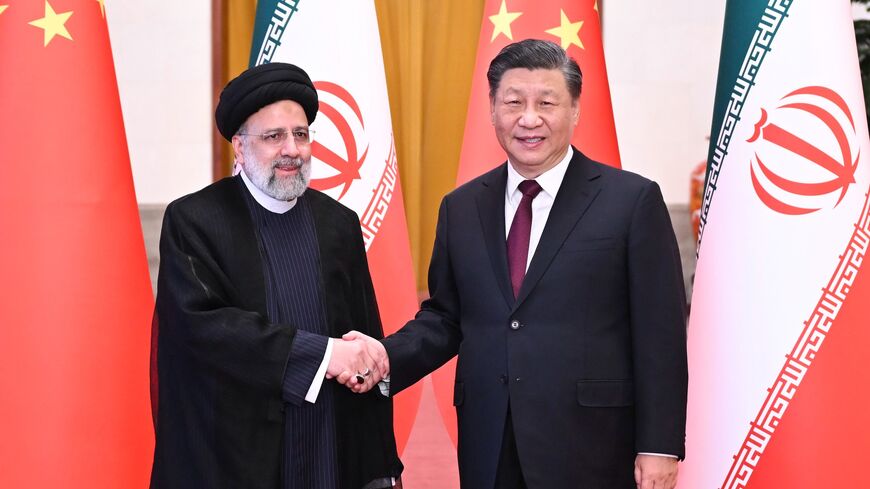Iranian and Chinese leaders have signed 20 cooperation documents and memoranda of understanding and discussed prospects for expanding bilateral ties.
The documents were signed by officials from both countries during Iranian President Ebrahim Raisi's visit to Beijing, the IRNA news agency reported on February 14.
The documents outlined several areas of mutual cooperation including crisis management, tourism, communication and information technology, environment, international trade, intellectual property, agriculture, export, healthcare, media, sports and cultural heritage.
The documents would include agreements in the field of transportation worth $12 billion, which include projects like the high-speed rail link between Tehran and Mashhad and investment in the Imam Khomeini Airport City. Investment in Iran's south-eastern Makran coast, and the purchase of Iranian oil are also mentioned in the documents.
The Iranian president arrived in Beijing on the morning of 14 February for a three-day visit at the head of a large delegation. On the first day of his trip, Raisi told the Chairman of the Standing Committee of the National People’s Congress Li Zhanshu that China and Iran are "friends in hard times".
He expressed his appreciation to the Congress for its "constructive support in advancing strategic bilateral ties", and urged the strengthening of parliamentary relations and cited the "historical proximity" of both countries.
In a meeting with Chinese Premier Li Keqiang, Raisi hailed the bilateral "25-year Strategic Roadmap", as a "sign of the resolve of the two nations to advance ties," and urged the speedy implementation of the agreement.
In his turn, Li Keqiang said that "the two countries are currently conducting constructive negotiations to advance ties", and expressed hope that deepening bilateral relations would aid the national interests of both countries.
On 14 February, Chinese President Xi Jinping held talks with his Iranian counterpart, and stressed that China has always viewed and developed its relations with Iran from a strategic perspective.
“No matter how the international and regional situation changes, China will unswervingly develop friendly cooperation with Iran, push for a new development of the China-Iran comprehensive strategic partnership, and play a positive role in world peace and human progress,” he was quoted by Xinhua as saying.
Xi noted that China is ready to work with Iran to implement a bilateral comprehensive cooperation plan, expand cooperation in trade, agriculture, industry and infrastructure, and import more high-quality Iranian agricultural products.
"China is willing to continue cooperation with Iran under the Belt and Road Initiative to promote connectivity and expand people-to-people exchanges," he added.
For his part, Raisi said Iran intends to strengthen relations with China at all levels, implement the comprehensive strategic cooperation plan and align the countries' efforts in the fields of trade and infrastructure, among others.
Iran firmly supports and will actively participate in the Belt and Road Initiative, the Global Development Initiative and the Global Security Initiative proposed by China, he said.
Raisi said Iran is willing to strengthen communication with China on international and regional affairs, maintain good cooperation on multilateral occasions such as the SCO, jointly safeguard international fairness and justice, and maintain regional and world peace and security.
The two leaders also attended the signing of a number of bilateral agreements in agriculture, trade, tourism, environmental protection, health, disaster relief, culture and sports.
Before leaving Tehran, Raisi said there remains potential to boost bilateral relations, which has yet to be fully explored.
The two countries took steps to implement the bilateral "25-year Strategic Roadmap", which was announced in 2016 and signed in 2021. This strategic roadmap covers a variety of economic activities from oil and mining to promoting industrial activity in Iran, as well as transportation and agricultural collaborations.
Dealing with an economic crisis, Tehran is aiming to attract billions in investment and make Iran a key part of China’s Belt and Road Initiative — a multi-trillion-dollar infrastructure scheme designed to stretch from East Asia to Europe. The project, aimed at significantly expanding China’s economic and political influence, has raised concerns in the United States.
China is also a signatory to the nuclear deal between Iran and world powers, along with Russia, Britain, France, and Germany.







 Armenian sappers commenced on Monday mine-clearance operations in the territories adjacent to the Saint Mary Church in village of Voskepar (Armenia...
Armenian sappers commenced on Monday mine-clearance operations in the territories adjacent to the Saint Mary Church in village of Voskepar (Armenia...
 The Mine Action Agency of Azerbaijan (ANAMA) reported on Thursday the discovery of a significant amount of explosives in the Khojavand district of ...
The Mine Action Agency of Azerbaijan (ANAMA) reported on Thursday the discovery of a significant amount of explosives in the Khojavand district of ...
 Russian Foreign Minister Sergei Lavrov has reasserted that Moscow has no intentions to stop the fighting in Ukraine, even if peace talks commence.
Russian Foreign Minister Sergei Lavrov has reasserted that Moscow has no intentions to stop the fighting in Ukraine, even if peace talks commence.



